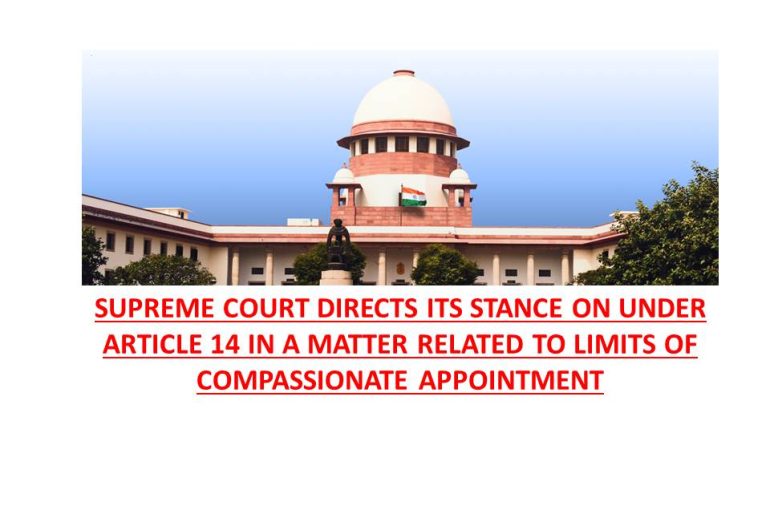SUPREME COURT DIRECTS ITS STANCE ON UNDER ARTICLE 14 IN A MATTER RELATED TO LIMITS OF COMPASSIONATE APPOINTMENT
Introduction
The Supreme Court, through its bench comprising Justices Abhay S. Oka, Ahsanuddin Amanullah, and Augustine George Masih, in its recent judgment in Tinku v. State of Haryana & Ors. (Civil Appeal No. 8540 of 2024) vide order dated November 13, 2024, stated that compassionate appointments are not vested rights but are strictly governed by policy guidelines intended to address immediate financial hardships following the death of a government employee. The Court dismissed the Appellant’s plea for a compassionate appointment due to the lapse of time but allowed for ex-gratia compensation to the Appellant’s mother, ensuring her opportunity to apply for financial assistance.
Facts
The Appellant, sought compassionate employment following his father’s death in 1997 while serving as a constable in Haryana Police. At the time, Appellant was only seven years old. His mother, being illiterate, did not apply for her own employment, instead registering Appellant’s name in a minors’ register for future consideration. In 2008, after reaching adulthood, Appellant requested appointment under the ex-gratia policy. However, the Haryana Government denied his application, citing a time limit imposed by 1999 instructions, which required that minors attain adulthood within three years of the employee’s death for compassionate employment.
Appellant challenged the rejection, arguing that the delay in his application was beyond his control, as he was a minor when his father passed away. The High Court dismissed his plea, leading to the current appeal.
Issues
1. Whether the rejection of Appellant’s application for compassionate appointment, based on the time lapse, was legally justified.
2. Whether the doctrine of promissory estoppel applies, considering prior communication with the appellant’s mother about Appellant’s registration for compassionate appointment.
3. Whether Appellant was entitled to ex-gratia financial assistance under Haryana’s compassionate assistance policies.
Appellant’s Arguments
Appellant argued that the doctrine of promissory estoppel applied, as the government had entered his name in the minors’ register, signalling an intention to provide him with compassionate employment later. He claimed that the rejection violated his right to equality, as others in similar circumstances had received compassionate appointments.
The Appellant further contended that the policy’s purpose was to support families facing financial hardships following the employee’s death, which should include children of deceased employees who were minors at the time.
Respondents’ Arguments
The state argued that according to the 1999 policy, minors should have reached adulthood within three years of the employee’s death to qualify for compassionate appointment.
It was further argued that, Compassionate appointment is not an inherent right but a privilege that must be strictly governed by policy guidelines. Since Appellant’s application was time-barred, the state claimed no further obligations, including ex-gratia assistance, were due.
Supreme Court’s Analysis
The Hon’ble Court noted that compassionate appointments are intended to aid families in immediate financial distress. Given the 11-year delay from the date of death to Appellant’s attainment of majority, the claim was deemed time-barred. Compassionate appointments must align with set policy parameters and cannot be a vested right.
The Court rejected the argument of promissory estoppel, clarifying that registering Appellant’s name did not create an irrevocable right to employment, especially given the clear limitations under the 1999 instructions.
The Court emphasized that compassionate appointments require strict adherence to policy, which cannot be influenced by past erroneous grants of similar benefits to others. The Court cited precedents holding that prior wrongful benefits do not justify future entitlements.
The Court examined the 2006 rules, which allowed for ex-gratia assistance instead of compassionate employment in cases where a claim was pending. The Court observed that Appellant’s mother had not been informed about her right to claim ex-gratia compensation, an omission attributed to administrative oversight.
Judgment
The Supreme Court dismissed Appellant’s claim for compassionate employment but allowed his mother to apply for ex-gratia compensation. The state was directed to consider her application within six weeks of submission, with no interest on delayed payments if resolved within this period. However, if the payment is delayed, the state must pay interest at 6% per annum from the date of application until payment.
Key Takeaways
- Compassionate appointment policies are exceptions to regular employment norms, granted strictly per policy criteria.
- Promissory estoppel does not apply where the governmental commitment is merely procedural, lacking any concrete right.
- Equality principles do not support the perpetuation of past irregularities; each claim must meet current legal and policy criteria.
- Courts can mandate ex-gratia compensation in lieu of compassionate appointment if the applicant was not duly informed about available relief options
ASHITA
ASSOCIATE
THE INDIAN LAWYER & ALLIED SERVICES





































Leave a Reply